Related Research Articles
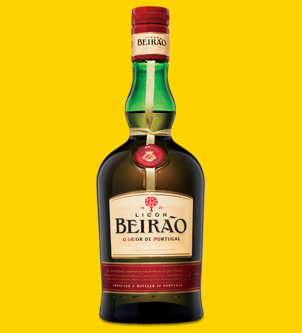
A liqueur is an alcoholic drink composed of spirits and additional flavorings such as sugar, fruits, herbs, and spices. Often served with or after dessert, they are typically heavily sweetened and un-aged beyond a resting period during production, when necessary, for their flavors to mingle.

An energy drink is a type of drink containing stimulant compounds, usually caffeine, which is marketed as providing mental and physical stimulation. They may or may not be carbonated and may also contain sugar, other sweeteners, or herbal extracts, among numerous other possible ingredients.
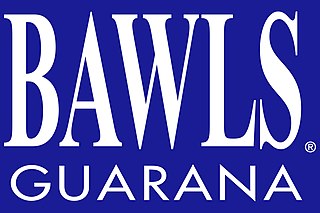
Bawls is a non-alcoholic, highly-caffeinated soft drink.

Aguardente (Portuguese), or aguardiente (Spanish), is a type of distilled alcoholic spirit that contains between 29% and 60% alcohol by volume (ABV). It is a somewhat generic term that can refer to liquors made from various foods. It originates from and is typically consumed on the Iberian Peninsula and in Iberian America.

Liquor is an alcoholic drink produced by the distillation of grains, fruits, vegetables, or sugar that have already gone through alcoholic fermentation. Other terms for liquor include: spirit, distilled beverage, booze, spirituous liquor or hard liquor. The distillation process concentrates the liquid to increase its alcohol by volume. As liquors contain significantly more alcohol (ethanol) than other alcoholic drinks, they are considered "harder." In North America, the term hard liquor is sometimes used to distinguish distilled alcoholic drinks from non-distilled ones, whereas the term spirits is more commonly used in the UK. Some examples of liquors include vodka, rum, gin, and tequila. Liquors are often aged in barrels, such as for the production of brandy and whiskey, or are infused with flavorings to form flavored liquors, such as absinthe.

The Société des alcools du Québec is a provincial Crown corporation and monopoly in Quebec responsible for the trade of alcoholic beverages within the province.
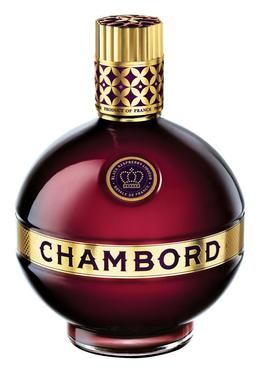
Chambord is a 16.5% abv raspberry liqueur modelled after a liqueur produced in the Loire Valley of France during the late 17th century. The Chambord product brand has been owned and produced by the Brown-Forman Corporation since 2006.

Vana Tallinn is an Estonian brand of liqueur manufactured continuously by Liviko since 1960. The recipe contains Jamaican rum and a variety of herbs and spices.
Rectified spirit, also known as neutral spirits, rectified alcohol or ethyl alcohol of agricultural origin, is highly concentrated ethanol that has been purified by means of repeated distillation in a process called rectification. In some countries, denatured alcohol or denatured rectified spirit may commonly be available as "rectified spirit", because in some countries the retail sale of rectified alcohol in its non-denatured form is prohibited.
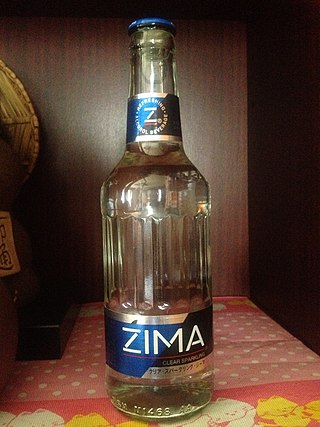
Zima Clearmalt is a clear, lightly carbonated alcoholic beverage made and distributed by the Coors Brewing Company or its licensees. Introduced in 1993, it was marketed as an alternative to beer, an example of what is now often referred to as a cooler, with 4.7–5.4% alcohol by volume. Its production in the United States ceased in October 2008, but it was still marketed in Japan until 2021, when sales ended due to the impact of the COVID-19 pandemic before returning in 2023. On June 2, 2017, MillerCoors announced a limited release of Zima for the U.S. market. It was sold again in the U.S. in the summers of 2017 and 2018, but did not return in 2019.

Licor 43, or Cuarenta y Tres, is a Spanish liqueur, made in Cartagena, Spain.

Four Loko is a line of alcoholic beverages sold by Phusion Projects of Chicago, Illinois, United States. Four Loko's recipe formerly included caffeine. Phusion operates as Drink Four Brewing Company. Four Loko, the company's most popular beverage, debuted in the United States market in 2005 and is available in 49 states, and in 21 countries including Ecuador, Guatemala, Paraguay, The Bahamas, Peru, Mexico, Colombia, Bolivia, Honduras, El Salvador, Nicaragua, Costa Rica, China, Canada and some countries in Europe. The name "Four" is derived from the original drink having four "key ingredients".

Korn, also known as Kornbrand or Kornbranntwein, is a German colorless distilled beverage produced from fermented cereal grain seed. The production of Korn uses only five grains: most of the production is based on rye or wheat; barley is mainly used to obtain the required malt for the brewing process; oats and buckwheat are rarely used. The addition of food colorings, flavorings, or sweeteners is not permitted. Korn is distilled to lower alcoholic proofs and less rigorously filtered than vodka, which leaves more of the cereal grain flavor in the finished spirit.

Whyte & MackayLtd is a company producing alcoholic beverages based in Glasgow, Scotland. The company is a subsidiary of Alliance Global Group, one of the largest alcoholic-beverage companies in Southeast Asia.
Lucas Bols N.V. is a Dutch public company in the business of production, distribution, sales and marketing of alcoholic beverages. It claims to be the oldest distillery brand in the world. Its brand portfolio consists of Bols, Galliano, Vaccari, Pisang Ambon, Gold Strike and a large group of Dutch genevers and liqueurs. It produces about 3 million cases a year, with yearly revenues exceeding 95 million euros.
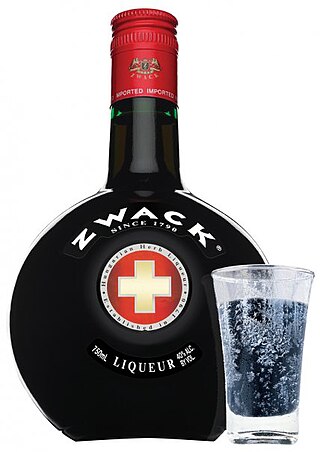
Zwack is a Budapest, Hungary-based company that makes liqueurs and spirits. The company produces an 80 U.S. proof herbal liqueur known as Unicum from a secret blend of more than forty different herbs and spices. Unicum is known as one of the national drinks of Hungary.

A caffeinated alcoholic drink is a drink that contains both alcohol and a significant amount of caffeine. Caffeine, a stimulant, masks some of the depressant effects of alcohol. However, in 2010 and 2011, this type of drink faced criticism for posing health risks to its drinkers. In some places there is a ban on caffeinated alcoholic drinks.

The 17 November 2010 United States ban on caffeinated alcoholic drinks is a ban which prevents the marketing and distribution of any prepackaged caffeinated alcoholic drink.
St. George Spirits is an artisanal distillery located in Alameda, California that produces a range of alcoholic beverages under the direction of Master Distiller Lance Winters. They are known for producing vodka, absinthe, whiskey, gin, brandy, liqueurs, and a range of exotic spirits.
References
- ↑ "Rhythm Citrus Liqueur (750ml)". MHW Portfolio. Mukherjee 10th St Liquor Store, LLC. Retrieved 30 May 2012.
- 1 2 Boyd, Terry (20 October 2008). "Entrepreneurs hope to find their 'rhythm' with new liqueur". Business First . Retrieved 30 May 2012.
- ↑ "Rhythm Launch Party celebrates entrepreneurial success!". Current News. University of Louisville College of Business. 2007. Retrieved 30 May 2012.
- ↑ Adkins, Ben (30 August 2010). "Founders of Rhythm liqueur bank on music to catapult brand". Business First. Retrieved 30 May 2012.
- ↑ Goodnough, Abby (10 November 2010). "Second State Bans Caffeinated Alcoholic Drinks". New York Times. Retrieved 6 March 2015.
- ↑ "World Spirits Competition: 2012" (PDF). World Spirits Competition. 15 December 2011. Retrieved 30 May 2012.